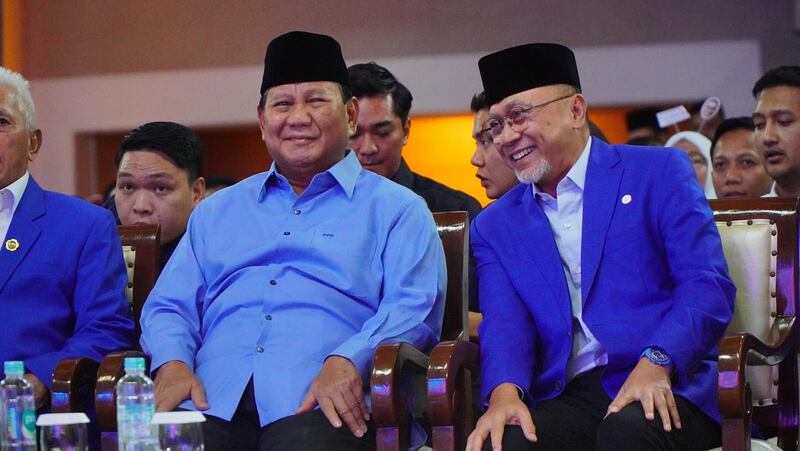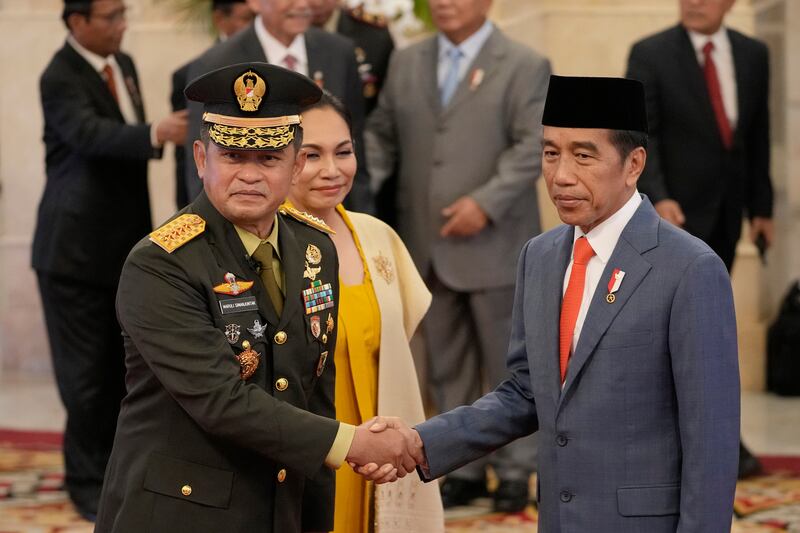Indonesian political observers and human rights activists are fearful for their country’s fledgling democracy after President-elect Prabowo Subianto warned his political opponents: Support his administration or do not interfere.
As it is, civil rights activists were concerned that this former army general accused of grave human rights abuses while in the military, and who supported the late dictator Suharto, was running for the presidency a mere 26 years after the country transitioned to democracy.
They worried even more that dissent would be suppressed and civil rights and liberties would whittle away after Prabowo won by a landslide in the Feb. 14 presidential polls – already, they believed, democracy had slid back during the two terms of outgoing President Joko “Jokowi” Widodo.
Prabowo’s warning to his opponents came in a speech on Thursday to executive members of the National Mandate Party (PAN), which backed him in the election.
“It’s fine for those who don’t wish to collaborate. If there are any who prefer to be onlookers from the sidelines, they are welcome to do so,” said Prabowo, who will take office in October.
“However, if you choose not to cooperate, please do not interfere,” he cautioned.
Prabowo, currently the defense minister, said Indonesia’s progress relied on cooperation among its political elite.
“I will continue to work with all willing forces,” he said.
Dimas Bagus Arya, coordinator of the human rights organization KontraS, said Prabowo’s remarks were troubling for democracy and Indonesia’s political environment, because an opposition was vital to prevent the concentration of power.
“This statement by Prabowo Subianto carries an undertone of intimidation and an inclination to assimilate all factions and the political elite into the orbit of power,” Dimas told BenarNews.
For another analyst, the comments by Prabowo, once a supporter of President Suharto’s New Order regime, indicate he has yet to become used to elective government.
“It suggests a lack of readiness for democracy, creating fear among people,” said Poltak Partogi Nainggolan, a political analyst at the National Research and Innovation Agency (BRIN).
“[T]he new administration should foster a conducive environment,” he told BenarNews.

However, Prabowo’s approach has its admirers, such as his backer PAN's Chairman Zulkifli Hasan, who defended the controversial comments as a sign of a resolute leadership style.
“The statement speaks for itself. Prabowo is a true fighter, committed to democratic principles,” Zulkifli told BenarNews.
Prabowo has been emboldened lately by some major parties signaling they were going to back him in Parliament even though they had supported his opponents in the presidential race. Two of them are the National Awakening Party (PKB) and the NasDem Party.
Prabowo’s own coalition had won a total of 48% of the 580 contested parliamentary seats in the legislative election that was also held in February.
With the possible addition of PKB, NasDem and others, a potential grand alliance could see Prabowo in control of a substantial majority in the House of Representatives. That would mean the elimination of any big hurdles in the implementation of the president-elect's policy agenda.
That would also mean the elimination of a viable parliamentary opposition – harmful for any democracy, but extremely dangerous for a young one like Indonesia, experts say.
Human rights organizations point to Jokowi’s two terms as an example of what a weak opposition could lead to.
They say Indonesian democracy experienced a regression throughout Jokowi’s tenure, a period marked by the support of a majority of the House’s lawmakers.
This backing is believed to have facilitated the enactment of contentious legislation, including revisions to the criminal code, the job creation law, and regulations governing the country’s main anti-corruption agency.
Under Jokowi’s leadership, the absence of formidable opposition in the legislature is said to have paved the way for these legislative changes.
Critics also point to a perceived erosion of free speech, an increase in limitations on civil liberties, and heightened police surveillance during this time.
Free lunch program
Now, analysts predict, these changes will become entrenched and more such ones will follow, because Prabowo has promised to continue Jokowi’s policies.
Many attribute Prabowo’s electoral victory to the tacit support he received from the very popular Jokowi.
The incumbent, who was elected president as a PDI-P candidate, twice, turned away from his party to back Prabowo’s presidential ticket, which included Jokowi’s eldest son, Gibran Rakabuming Raka, as the vice-presidential nominee.
Experts said Jokowi’s move was an attempt to maintain political influence even after he steps down in October and underscored his desire to ensure his policies continue under the next administration.

Meanwhile, one policy agenda item that seems to be all his own, is Prabowo’s plan to offer free lunches to all Indonesian school students – that’s 82 million children, according to the Jakarta Post.
Trubus Rahardiansyah, a public policy expert, sees Prabowo’s statements that were laced with a warning in the context of some significant policy burdens his administration is expected to face -- the free lunch program, for instance, will strain state coffers.
“I see Prabowo’s policy programs as potentially challenging to implement,” said Trubus, from Trisakti University in Jakarta. So Prabowo is telling opposing parties to refrain from interfering with his administration’s agenda, Trubus added.
The president-elect plans to begin the program as soon as he takes office but implementation will be gradual. His team estimates the program will cost U.S. $6.2 billion to $7.4 billion in the first year.
But political cooperation cannot be demanded through intimidation.
Trubus condemned Prabowo’s remarks as reflective of political arrogance, warning of the potential erosion of democratic norms.
“If everyone aligns with the government, public critique becomes untenable,” Trubus said.
“I perceive a gradual sidelining of our democracy, teetering on the brink of extinction.”
